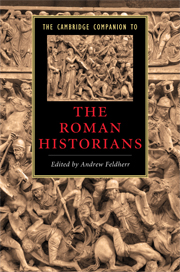Book contents
11 - Virtue and violence: The historians on politics
from Part III - Subjects
Published online by Cambridge University Press: 28 November 2010
Summary
In his 1864 book La Cité antique, Numa Denis Fustel de Coulanges warned against glorifying ancient narratives of civil government in the fashion of revolutionaries like Robespierre and Desmoulins, who had vainly hoped to re-make modern France in the image of the regime memorialized in Sallust, Livy, and Tacitus: virtuous republics where, Fustel de Coulanges complained, the citizen was the virtual property of a state governed by an austere militaristic code. Latin historical writers no longer command the influence they did in the age of revolutions, but the political questions they pose remain the subject of critically important debate today: the nature of civic virtue, the collective values of the community and the extent of its legitimate claim on the citizen, the role of conflict in domestic and foreign politics, the significance of public speech, and the corrupting power of tyranny. In what would doubtless strike Fustel de Coulanges as an ominous return to the past, some political theorists argue that the republican tradition opens up the possibility of a third way between communitarianism and liberalism, “hope for revitalizing our public life and restoring a sense of community.”
- Type
- Chapter
- Information
- The Cambridge Companion to the Roman Historians , pp. 181 - 194Publisher: Cambridge University PressPrint publication year: 2009
- 3
- Cited by

